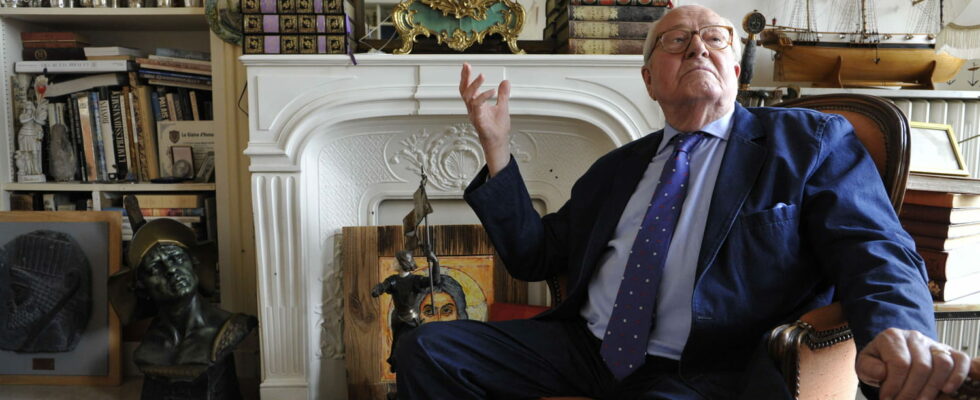Jean-Marie Le Pen, who died on January 7, leaves behind a fortune as colossal as it is mysterious. Who will receive his inheritance?
Jean-Marie Le Pen took his last breath on Tuesday January 7 at the age of 96. Coming from a modest family, his father was a fisherman and his mother a seamstress, the founder of the National Front nevertheless enjoyed a good fortune at his death. Although he began with small jobs to finance his studies, in 1963 he launched the Société d’études et de relations publique, a record company specializing in the broadcast of military songs and political speeches, but it was not with this activity that he made his fortune.
The deceased politician saw his life turned upside down during his meeting in the 1970s with Hubert Lambert, heir to Lambert cements, with whom he shared the same political opinion. Jean-Marie Le Pen then appointed him to the central committee of the National Front, whose coffers his friend had filled well at the time. The latter, an alcoholic, died prematurely at just 42 years old in 1976. Single and without descendants, he then decided to make Jean-Marie Le Pen his sole heir. He then obtained capital equivalent to 30 million francs, or 4.5 million euros. This succession did not take place without turmoil: a cousin of the deceased wanted to contest the will but ultimately reached an agreement with Jean-Marie Le Pen.
Jean-Marie Le Pen also received real estate, notably the Montretout mansion in Saint-Cloud, which he had made his family residence and then his party’s headquarters. The value of this property has been the subject of speculation ranging from 2.5 to 6 million euros. During his life, he acquired other properties including a villa in Rueil-Malmaison, where he resided with his wife, which was finally resold for more than 2 million euros in 2023, realizing a nice capital gain. , according to Challenges. He also had a house, estimated at 1 million euros according to The Chained Duck, in La Trinité-sur-Mer, for which he signed two donations in 1999 and 2006 to pass it on to Yann, Marine and their six children, including Marion Maréchal.
An inheritance of uncertain amount
During his career, Jean-Marie Le Pen was accused several times of having taken advantage of the system to enrich himself. It has also been the subject of numerous tax audits. Mediapart had, for example, revealed that Jean-Marie Le Pen had opened an account in Switzerland in 1981. Two years later, he was accused by the media of having been the beneficiary of a “trust” of several million euros managed by his butler in Switzerland.
Jean-Marie Le Pen had denied the accusations. Concerning his fortune, he simply declared that he had been subject to the wealth tax, which became the real estate wealth tax in 2018. In 2022, during an interview with Jordan Deluxe, he added: “Rich? No , no… I live off my pension. It must be around 12,000 euros. I have a professional pension, I have my deputy’s pension.
The total value of the assets of the founder of the FN is therefore complicated to evaluate precisely. His three daughters, Yann, Marie-Caroline and Marine will be affected by the inheritance. Since 2023, they have already managed their father’s day-to-day affairs. His wife Jany is also one of the first legitimate heirs of the “menhir”.
In 2019, the question of the transmission of his fortune was asked to him, in an interview with BFMTV. “It is the law which provides for it”, he replied to journalists, adding: “I have the right to a reserved share, you will allow me to maintain discretion over my testamentary decisions”.
French law on the matter is very clear: since Jean-Marie Le Pen’s children were not those of his wife, she inherits a quarter of the estate in full ownership, made up of the usufruct and the bare -property. Jean-Marie Le Pen’s daughters inherit three-quarters of the estate in full ownership. But the calculation may vary depending on the matrimonial regime concluded by the marriage contract and if a donation to the last living person has been made. Jean-Marie Le Pen was also able to bequeath a small part of his assets, if he included it in a will, to an heir or a third party, such as a grandchild for example.
